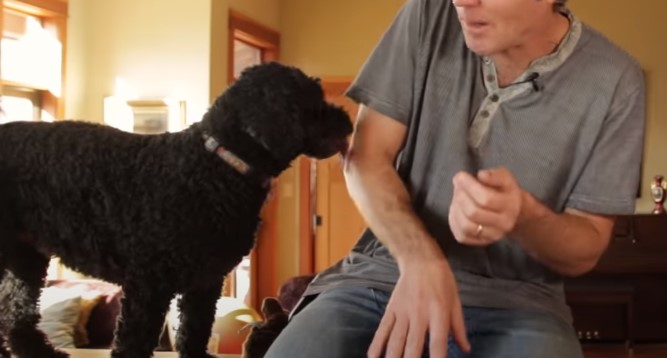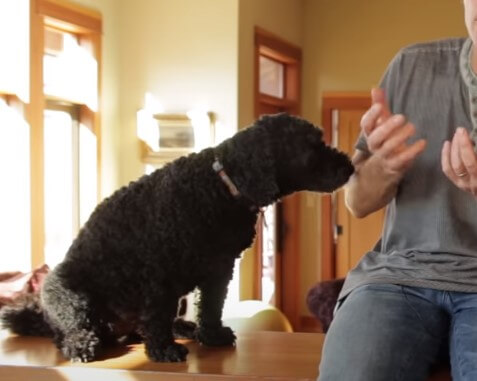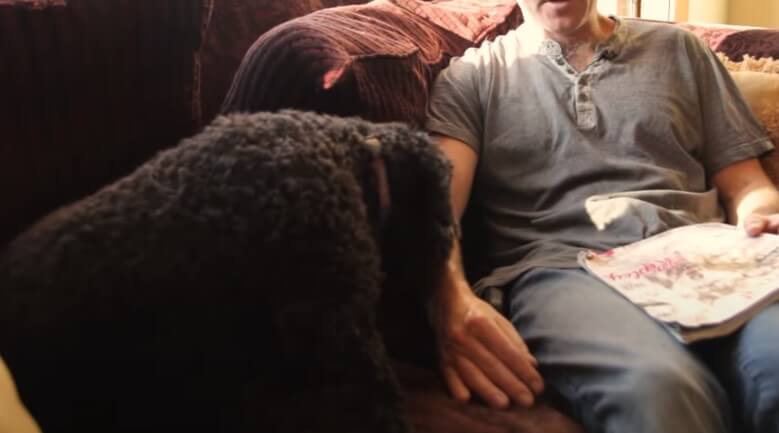Your dog may want to hold your hand in its mouth due to a natural instinct known as “mouthing.” Dogs have their own unique ways of communicating with their owners.
One such behavior that some dogs exhibit is the desire to hold their owner’s hand in their mouth. While this may seem odd or even slightly concerning, it is actually a completely normal behavior for dogs. This behavior is known as “mouthing” and is believed to be a remnant of their wild instincts.
In this article, we will explore the reasons behind why does my dog want to hold my hand in his mouth and how you can respond to this behavior. So, let’s dive in and unravel the mystery behind your dog’s hand-holding habit.
Understanding The Canine Behavior
Dogs are known for their unique and sometimes quirky behaviors, and one of the more endearing ones is when your furry friend wants to hold your hand in his mouth. While it may seem strange, there is actually a fascinating explanation behind this behavior.
Understanding why dogs engage in this can help deepen your bond with your pet and enhance your overall relationship. We will delve into the topic of why dogs want to hold your hand in their mouth, focusing on the canine behavior involved.
Dogs As Social Animals:
- Dogs are highly social animals, and they rely on social interaction for their emotional well-being.
- Mimicking social behavior is common among dogs, as they often learn by observing and imitating their owners.
- Holding your hand in their mouth may be a way for dogs to mimic the physical contact they see between humans.
Importance Of Physical Contact:
- Physical contact plays a crucial role in a dog’s life, as it offers comfort, security, and a sense of belonging.
- By holding your hand in their mouth, dogs may be seeking physical closeness and reassurance from their owner.
- This behavior can be seen as an expression of trust and affection, as dogs see their owners as a source of comfort and safety.
Understanding the underlying reasons behind your dog’s desire to hold your hand in their mouth can deepen your connection and strengthen the bond between you and your furry companion.
So, the next time your dog reaches for your hand, embrace this moment of canine affection and enjoy the unique and heartwarming gesture.
The Hand-Mouthing Behavior
Why does my dog want to hold my hand in his mouth
Have you ever noticed your dog grabbing your hand with his mouth? At first, it may seem strange or even mildly concerning. But fear not, because this behavior is actually quite common among our four-legged friends.
In this post, we will delve into Why My Dog Wants to Hold My Hand in His Mouth and into the intriguing world of hand-mouthing behavior in dogs and explore the reasons behind it.
Let’s take a closer look.
Curiosity Or Exploration?
Dogs are naturally curious creatures, always ready to explore their surroundings. Hand-mouthing behavior can often be attributed to this inherent curiosity. Here are some key points to consider:
- Investigating through touch: Just like humans use their hands to explore and experience the world, dogs rely on their mouths to gain tactile information about objects and people.
- Sensory exploration: Dogs possess an exceptional sense of smell, and the act of mouthing your hand may allow them to gather more information about you. From the scent of your skin to the taste of any residue on your hands, they are eager to learn more about the beings in their lives.
- Potential teething discomfort: Puppies, in particular, may engage in hand-mouthing behavior as they go through the teething process. Chewing and mouthing objects provide them with relief from pain and discomfort caused by new teeth breaking through their gums.
Instincts And Canine Communication
Dogs have a rich repertoire of behaviors that they use to communicate with us and with each other. Hand-mouthing can be seen as an instinctual communication method. Consider the following points:
- Mouth-based communication: Dogs use their mouths to convey a variety of messages. By gently holding your hand in their mouths, they may be expressing a desire for attention, seeking comfort, or indicating trust and affection.
- Imitating maternal behavior: Puppies often learn how to interact through mouth-to-mouth contact with their mothers and littermates. This behavior can carry over into adulthood, where they may seek similar interactions with their human family.
- Invitation to play: For some dogs, hand-mouthing may be an invitation to engage in play. By gently holding your hand, they may be signaling their desire for interaction and fun.
Puppy Behavior Vs. Adult Dog Behavior
It’s essential to differentiate between hand-mouthing behavior in puppies and adult dogs. Understanding these differences can help us address and guide this behavior effectively. Consider the following points:
- Teething phase: Puppies experience hand-mouthing behavior during their teething phase as a way to alleviate discomfort. However, it is crucial to gradually discourage this behavior to prevent any accidental nips or bites as they grow older.
- Socialization and training: Proper socialization and training play crucial roles in shaping a dog’s behavior. By providing appropriate guidance and teaching them alternative ways to interact, we can help puppies and adult dogs learn acceptable manners and limit hand-mouthing behavior when necessary.
- Past experiences: Adult dogs may exhibit hand-mouthing behavior due to past experiences or reinforcement. For example, if they were previously rewarded or had positive interactions when mouthing hands, they may continue this behavior. Positive reinforcement training can help modify and redirect this behavior to more suitable alternatives.
Understanding the reasons behind your dog’s hand-mouthing behavior is the first step towards addressing it effectively. By using positive training techniques, providing appropriate alternatives, and promoting proper socialization, we can create a harmonious relationship with our furry companions while keeping their natural instincts in mind.
Key Factors Influencing Hand-Mouthing
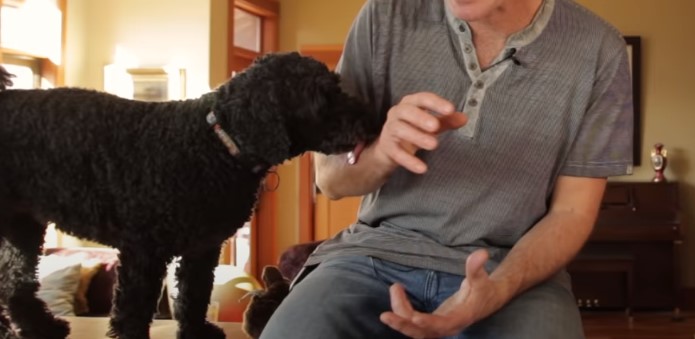
Dogs are known for their adorable and sometimes quirky behaviors, and one particularly perplexing habit is when they want to hold our hands in their mouths. You may wonder why your furry friend does this and what it signifies. In this blog post, we will delve into the key factors that influence hand-mouthing behavior in dogs.
Understanding these factors can help shed some light on this endearing yet puzzling gesture. So, let’s explore further under each category.
Breed And Individual Traits
- Different dog breeds may have varying tendencies toward hand-mouthing behavior.
- Certain breeds, such as retrievers and spaniels, are more prone to this behavior due to their natural instinct to carry objects in their mouths.
- Individual personality traits also play a role, as some dogs may be more inclined to show affection by gently grasping your hand with their mouths.
Environmental Factors
- The environment in which a dog grows up can influence their behavior, including hand-mouthing.
- Dogs who were not properly socialized during their early development stages may engage in hand-mouthing as a way to explore and interact with their surroundings.
- Stressful or anxious environments can also trigger this behavior as a coping mechanism or a way to seek comfort from their owners.
Human-Animal Bond
- The strong bond between humans and dogs often motivates hand-mouthing behavior.
- Dogs may see their owners as members of their pack and seek physical contact to feel connected and secure.
- Hand-mouthing may also be a sign of trust and affection, as dogs use their mouths to interact with their loved ones, mimicking the ways they would with their canine packmates.
Understanding the various factors that contribute to hand-mouthing behavior can help dog owners better interpret their pet’s actions. While it may seem unusual or even slightly uncomfortable at times, it’s important to recognize this behavior as a form of communication and affection from our furry companions.
By nurturing the bond we share with our dogs and providing a positive environment, we can create a stronger connection and a happier, healthier relationship. So, embrace the hand-mouthing moments and cherish the unique way our dogs express their love for us.
Training And Managing Hand-Mouthing
Dogs have their own unique ways of expressing affection, and one interesting behavior that some dog owners have experienced is their furry friend wanting to hold their hand in their mouth. Although this may seem strange to us humans, it can actually be a sign of trust and connection.
However, if your dog’s hand-mouthing behavior becomes excessive or uncomfortable, it’s important to address it through proper training and management techniques.
Positive Reinforcement Techniques
One effective approach to managing your dog’s hand-mouthing behavior is through positive reinforcement techniques. By utilizing rewards and praise, you can encourage desirable behaviors while discouraging the unwanted behavior. Here are some key points to implement this technique:
- Use treats and rewards to reinforce your dog’s good behavior when they refrain from mouthing your hand.
- Provide an alternative chew toy or object that your dog can redirect their chewing instincts towards.
- Utilize verbal cues such as “gentle” or “no bite” when your dog starts to mouth your hand, and reward them when they respond appropriately.
- Consistency is key when implementing positive reinforcement techniques. Ensure that all family members or household members are on the same page and follow the training plan.
Redirecting The Behavior
Another approach to managing hand-mouthing behavior is through redirecting the behavior towards more appropriate activities. This entails providing your dog with alternative outlets for their chewing and mouthing instincts. Consider the following points to redirect the behavior effectively:
- Engage your dog in interactive play sessions with chew toys, ropes, or other appropriate objects that they can chew on.
- Use puzzle toys or treat-dispensing toys to mentally stimulate your dog and keep their focus away from mouthing your hand.
- Encourage your dog to engage in physical exercise and playtime to release excess energy, as this can help reduce unwanted behaviors.
Seeking Professional Help
If your dog’s hand-mouthing behavior persists or becomes uncontrollable, it may be necessary to seek professional help. A certified dog trainer or animal behaviorist can assess the underlying reasons for the behavior and provide tailored guidance.
Here are some important considerations when seeking professional help:
- Look for a professional who uses positive reinforcement methods and has experience dealing with hand-mouthing behaviors.
- The professional can provide you with a customized training plan and guide you through the steps necessary to manage the behavior effectively.
- They may also help address any underlying behavioral issues that contribute to the hand-mouthing behavior, such as anxiety or fear.
It’s important to remember that training and managing hand-mouthing behavior takes time and patience.
By implementing positive reinforcement techniques, redirecting the behavior, and seeking professional help when needed, you can work towards curbing this behavior and fostering a strong bond with your furry companion.
Safety Concerns Related To Hand-Mouthing
If you’ve ever wondered why your dog wants to hold your hand in their mouth, you’re not alone. While it may seem strange or even concerning, this behavior is actually quite common among canines.
In this section, we will explore the safety concerns related to hand-mouthing and how to establish boundaries with your furry friend.
We will also touch upon the topic of hand-mouthing with children and provide some helpful tips on managing this behavior.
Biting Vs. Gentle Mouthing:
- Dogs, especially puppies, explore their world through their mouths. Hand-mouthing is often a way for them to play and interact with their human companions.
- It’s important to distinguish between biting and gentle mouthing. Biting involves aggression, whereas gentle mouthing is a way for dogs to express affection or seek attention.
- If your dog’s mouthing becomes painful or aggressive, it is crucial to address the behavior and seek professional training assistance if necessary.
Establishing Boundaries:
- To ensure a safe and enjoyable interaction with your dog, it’s essential to establish clear boundaries regarding hand-mouthing.
- Teach your dog the “leave it” and “gentle” commands to redirect their mouthing behavior to appropriate toys or objects.
- Consistently reinforce positive behavior and reward your dog with treats or praise when they demonstrate gentle mouthing or respect your boundaries.
Children And Hand-Mouthing:
- For families with children, managing hand-mouthing behavior becomes even more crucial.
- Teach children to avoid excessive rough play with dogs and to respect their boundaries.
- Supervise interactions between children and dogs closely, ensuring that both parties are comfortable and safe.
- Encourage children to play with dogs using appropriate toys to redirect their attention from hand-mouthing.
By understanding the differences between biting and gentle mouthing and establishing boundaries with your dog, you can ensure a harmonious and safe relationship.
When it comes to hand-mouthing with children, proper supervision and education are vital. Remember, with patience, consistency, and positive reinforcement, you can effectively manage this natural behavior in your furry friend.
Health Considerations
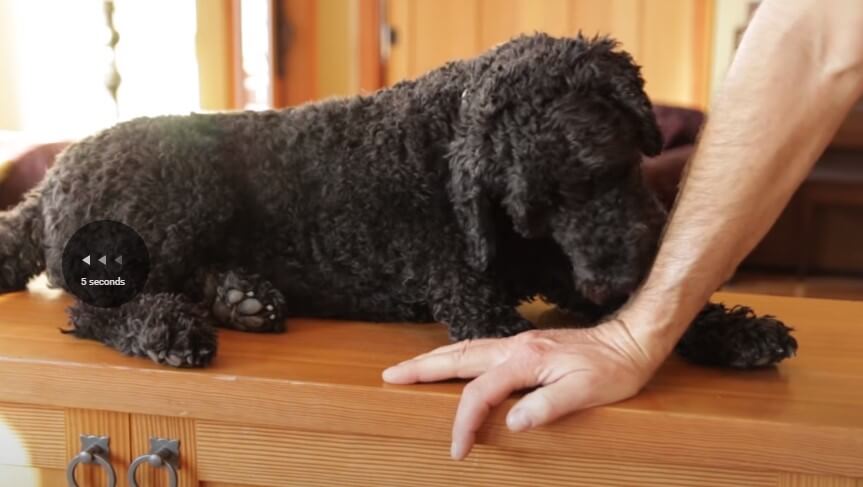
Why does my dog want to hold my hand in his mouth
We all love our dogs for their unique quirks and behaviors, but have you ever wondered why your furry friend insists on holding your hand in his mouth?
While it may seem strange or even uncomfortable at times, there are actually several reasons why dogs exhibit this behavior.
In this section, we will explore the health considerations that may contribute to your dog’s desire to hold your hand in his mouth.
Dental Health And Chewing Needs
- Dogs, like humans, have a natural urge to chew. Chewing not only helps to keep their teeth clean and healthy but also provides them with mental stimulation and relieves anxiety.
- Holding your hand in his mouth may be a sign that your dog is teething or experiencing discomfort in his gums. The gentle pressure of your hand can help alleviate some of the pain or itchiness.
- Some dogs may be more prone to gum disease or dental issues, and the act of holding your hand in his mouth could be their way of seeking relief or comfort.
- Providing appropriate chew toys or treats designed to promote dental health can help redirect your dog’s chewing behavior and prevent them from focusing solely on your hand.
Nurturing Behavior In Canines
- Dogs are social animals and have a deep desire for companionship and affection from their human counterparts. Holding your hand in his mouth may be a way for your dog to bond and form a deeper connection with you.
- This behavior can be linked to a dog’s instinctual need to nurture. Mimicking the actions of a mother dog holding her pups gently in her mouth, your dog may view this behavior as a form of affection and care.
- Just like how humans hold hands as a way to show love and support, dogs may view holding your hand in their mouth as a similar gesture.
Monitoring For Signs Of Discomfort Or Pain
- While the act of holding your hand in his mouth can be harmless, it’s important to monitor your dog for any signs of discomfort or pain.
- Excessive biting or pressure during this behavior may indicate dental issues or oral pain that requires attention from a veterinarian.
- Look out for any swelling, bleeding, or redness in your dog’s gums or mouth, as these could be signs of infection or injury.
- Regular dental check-ups and proper oral hygiene can help prevent dental problems and ensure your dog’s overall health and well-being.
Overall, the act of your dog holding your hand in his mouth can have a variety of underlying reasons. From dental health and chewing needs to nurturing behavior and bonding, understanding these health considerations can help you better interpret and respond to your dog’s actions.
However, always remember to monitor for signs of discomfort or pain, and consult with a veterinarian if you have any concerns about your dog’s oral health.
Strengthening The Bond
Dogs have interesting ways of showing their affection towards their human companions, and one of these behaviors is holding their hand in their mouth. While it may seem strange at first, this action can actually be a sign of a strong bond between you and your furry friend.
Understanding why your dog does this can help strengthen your connection even further. In this section, we will explore two key aspects of this behavior: quality time and play, as well as alternative forms of physical contact. Let’s delve deeper into these topics.
Quality Time And Play:
- Spending quality time with your dog is crucial for building a strong bond. Engaging in play activities helps create a sense of trust and companionship.
- Regular play sessions with your dog give you both an opportunity to connect on a deeper level. Playing together promotes a sense of joy and can result in a more loving and close relationship.
Alternative Forms Of Physical Contact:
- While holding your hand in their mouth is one way dogs express their affection, there are other forms of physical contact they may engage in.
- Your dog may choose to nuzzle your hand, lean against your leg, or curl up beside you when they seek comfort and closeness. These actions all contribute to the strengthening of the bond between you and your pup.
Deepening The Human-Animal Connection
In addition to quality time and alternative forms of physical contact, holding your hand in their mouth can also deepen the connection between humans and animals in general.
Research suggests that physical touch releases oxytocin, a hormone associated with bonding and emotional connection, in both dogs and humans.
This mutual release of oxytocin reinforces the sense of love and trust between you and your dog.
By understanding and appreciating why your dog wants to hold your hand in their mouth, you can further nurture the bond you share.
Making an effort to spend quality time together, engaging in play, and exploring other forms of physical contact will not only strengthen your relationship but also create a harmonious and loving environment for both you and your furry companion.
So, enjoy those moments of handholding with your dog, as it is a true testament to the special connection you share.
Read More Post:
10 Expert Tips: How To Make A Dog House Out Of Cardboard
Frequently Asked Questions
Why Does My Dog Try To Hold My Hand In His Mouth?
Some dogs exhibit this behavior as a way to bond and show affection. It’s similar to how they would playfully hold another dog’s paw. It could also be a sign of trust and seeking comfort from their human companions. Monitor their behavior and ensure it remains gentle and non-aggressive.
Is It Normal For Dogs To Want To Hold Hands In Their Mouths?
Yes, it is considered normal behavior for certain dogs. It’s their way of expressing their bond and seeking comfort from their human companions. However, if the behavior becomes rough or aggressive, it’s essential to seek professional advice to understand the underlying cause and address any training or behavioral issues.
Why Does My Dog Like To Chew On My Hand?
Some dogs may chew on their owner’s hand as a form of play. It could be a carryover from their natural instinct to chew and explore the world through their mouth. To redirect this behavior, provide them with appropriate chew toys and engage in interactive play sessions to satisfy their need for mental and physical stimulation.
How Can I Stop My Dog From Wanting To Hold My Hand In His Mouth?
To discourage this behavior, gradually replace your hand with a suitable toy or chew bone. Offer positive reinforcement when they show interest in the toy instead of your hand.
If the behavior persists or becomes aggressive, consult with a professional dog trainer or behaviorist for personalized guidance and training techniques.
Is It Safe To Allow My Dog To Hold My Hand In His Mouth?
While it may be safe in many cases, it’s important to monitor the behavior closely. Ensure that your dog is gentle and doesn’t apply excessive pressure or become aggressive.
If the behavior becomes rough, it’s advisable to redirect their attention to appropriate chew toys and provide training to prevent any potential accidents or injuries.
Conclusion
To sum up, it is not uncommon for why do dogs put your hand in their mouth. This behavior can be traced back to their ancestral instincts for grooming and feeling secure. By engaging in this action, dogs are showing trust and affection towards their owners.
It is essential for pet owners to understand that this behavior is not harmful or aggressive, but rather an inherent part of their canine nature. However, it is still crucial to set boundaries and discourage this behavior if it becomes too rough or uncomfortable.
Providing alternative outlets for your dog’s chewing and comforting needs, such as chew toys or blankets, can help redirect their behavior. Remember to respond to this behavior in a positive and gentle manner, as it is an indication of the strong bond and love that dogs have for their human companions.
Read More Post: 10 Expert Tips to Keep Your Dog Cool During Travel
- Smelly House Because of Dog? Take These Hygiene Tips - May 20, 2025
- How to Introduce a Dog To a Cats Without Chaos - May 6, 2025
- 4 Best Cavapoo Rescues in the UK 2024 - April 5, 2024
